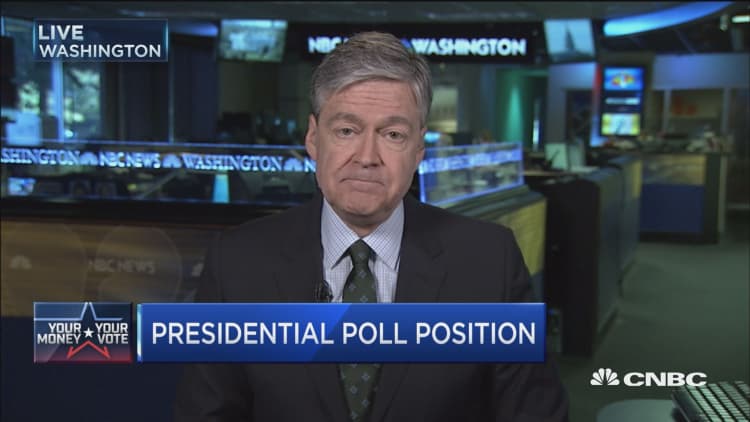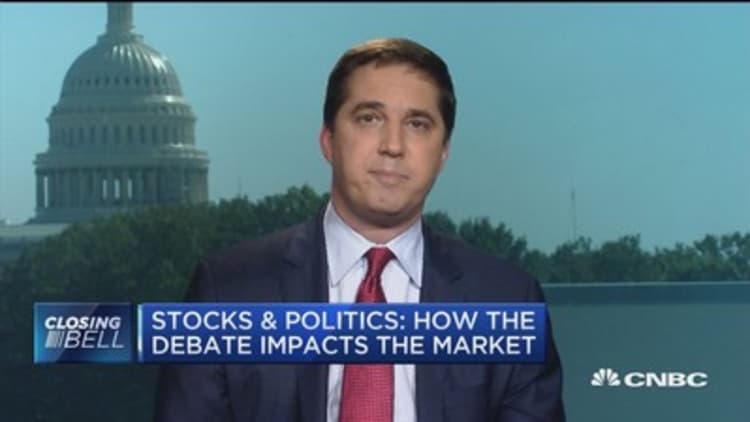The first presidential debate Monday may be a near-term catalyst for stocks, if either candidate looks set to break out.
So far, Wall Street has favored an Election Day victory by Democrat Hillary Clinton, based on the fact she is a known entity, with a strong government background and known policies. Republican Donald Trump, on the other hand, has an aura of uncertainty, with a volatile personality and changing views on key issues, though some on Wall Street are warming to his tax proposals and economic plan.
Just like the election, Clinton is seen by some strategists as having a slight edge in the debate, but it's really not clear which way it will go. The latest NBC/Wall Street Journal poll gives Clinton a 6 point lead, 43 percent to Trump's 37 percent, among likely voters.
"Stocks usually rally if the incumbent party wins. If Hillary puts Trump away at this debate, you'll see a broad rally in the S&P 500, and my thinking on Trump is if Trump wins, you're going to get a sell-off into the election. It's temporary. There's just so much uncertainty with Trump, people are just going to go to a risk-off scenario," said Daniel Clifton, head of policy research at Strategas.
Since 1992, the has gained an average 0.85 percent on the day after the first major debate between the two key presidential candidates, according to Strategas. The firm's data eliminated an 8.8 percent deline in 2008 since the market was caught up in a heated congressional debate about the "TARP" program to help banks during the peak of the financial crisis.
"I still feel the markets have not priced in a potential Trump victory. I think most people in the market think she's going to win and if you look at the electoral college map, you can still make that case even though it's tightened. I think the market would have to focus on what it means if he were to win," said Greg Valliere, chief global strategist at Horizon Investments. "First and foremost, the market has to care about uncertainty. He changes his positions with regularity."
Clifton said if Trump, on the other hand, comes out of the debate with more momentum, certain sectors — biotech, defense, oil and gas, and some non-large-bank financials — could do better. Should Clinton get a boost, renewable energy and infrastructure stocks could gain, in addition to the broader market.
"We think sectors are important for elections. There's a little bit more macro risk to this election because of Trump on trade. If Trump came in, by executive order which he could do, and put tariffs on all imports, that would be terrible for the markets," said Clifton.
But a plus for Trump are his tax proposals including a cut in the corporate tax rate. "Trump might end up being very good for the markets because his tax reform and regulatory reform are good for growth," he said, pointing to Trump's easier views on regulation of energy drilling and some financial services.

Clifton said he is watching the sectors as a barometer for the candidates, and a portfolio he structured to show a Democratic party win showed Clinton with a 57 percent chance of winning as of Friday. In the last seven elections, first debates have resulted in a widening of polling margins of at least 2 percentage points, and that would be key in this election where Clinton's lead is not that wide in some polls.
In a study of all presidential debates going back to 1980, analytics firm Kensho found that the S&P 500 was lower 52 percent of the time one week later, with an average decline of a half percent. That includes the 2008 late September, early October one week decline of 9.4 percent.
Political strategists say Monday's challenge for each candidate is clear. Clinton needs to appear physically strong in the debate and overcome concerns about her health, after a recent bout with pneumonia and other past health issues. Trump needs to appear presidential, like a steady hand who can be trusted to lead the nation.
"If he's snarling and nasty, that might please his base but will it look presidential for a lot of swing voters who have not paid that much attention? Will Hillary Clinton still look energetic in the last half hour? She'll probably win points. Her knowledge of the details still exceeds his. He may have some gaffes and get some facts wrong, but for most viewers it will [be] the image he's projecting," said Valliere.
Strategists say this first of three debates could give one candidate or other more momentum since it is such a tight race, with Clinton ahead by a small margin in some polls. There is a lot at stake.
"You have 100 million people watching. You have a race that is basically tied right now, and you have deep concerns over both candidates that are going to be in the debate. They are two of the most unpopular candidates for president in modern polling history," Clifton said.
DoubleLine Capital CEO Jeffrey Gundlach told CNBC that he has believed that Trump will be president, and that the Republican has momentum. "(Trump) certainly has a monumental opportunity to really gain further momentum," he said. "I would also acknowledge he has the opportunity to blow himself up on Monday."
Should Trump do well, Gundlach said he may pull ahead in the polls, but that could create downside volatility in the markets. That's because of the view that if it looks like Trump is going to win, "the world is going to come to an end."

Sam Stovall, chief U.S. equity strategist at S&P Global Market Intelligence, said the debate could matter for markets. Historically, since World War II, the odds are more than 80 percent that if the market rallies between July 31 and Oct. 31, the incumbent party retains the White House. As of Thursday's close, the S&P 500 was marginally higher, just about 4 points above its close at the end of July.
"If Donald comes away (from the debate) looking so much better, it adds to the uncertainty associated with somebody who has never run any political office running the most important one in the world. Indirectly, I think that could put pressure on stock prices," he said.
"If she wins, it's basically the current administration carried over for another four years, with not much uncertainty associated with their policies. As a result, I think there's less of a likelihood for an indirect decline in equity prices, with the focus remaining more on the fundamentals such as earnings and interest rates."
Some market strategists, however, say the market may react to the debate and election but unless there is a sweep by one party or other in Congress, the impact could be minor. "I'm sure there could be some knee-jerk reaction if the debate is one-sided," said James Paulsen, chief investment strategist at Wells Capital Markets. "I think more important is whether the economic data is going to pick up or not, and either way it goes, that is going to set the tone."
Paulsen said a split Congress would guarantee gridlock and that would be status quo for markets.
"I'm sure if (the race) tightens up and I suspect it might, markets will react on the margin but I don't think it's going to be the driving force. I just think that no one gets tri-power, which seems unlikely, I don't think they can do much. They talk big but none of it can be implemented anyway," he said.
Clifton said the election could be similar to the election of George H.W. Bush in 1988, a Republican following the popular two-term Republican Ronald Reagan. Bush did well in the debate and rose in the polls.
"This is an event that could move the needle in one direction or other," he said.
Disclosure: CNBC parent, NBC Universal, is minority stakeholder in Kensho


